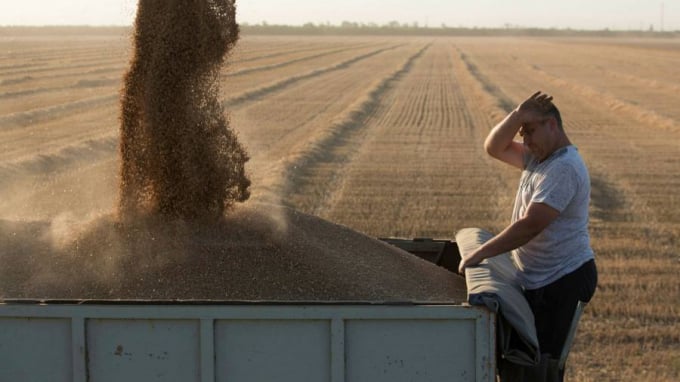June 1, 2025 | 18:02 GMT +7
June 1, 2025 | 18:02 GMT +7
Hotline: 0913.378.918
June 1, 2025 | 18:02 GMT +7
Hotline: 0913.378.918

Wheat prices have hit record highs on intensifying concerns of a supply shortage because of the war in Ukraine, raising the spectre of soaring global food inflation. Photo: bisecommunity
Earlier this week, prices had shot to a 14-year high.
"On the continuous futures, the Chicago March winter wheat futures contract set a then all-time high of $13.34 1/2 cents on Feb 27, 2008. Today, the March 2022 has traded to $13.40. So on some continuous charts, a new record today," says Bill Nelson of ProFarmer. "The wonky part of this is that today's record is for wheat futures in delivery. The comparable data from 2008 are for wheat futures ahead of delivery. Some will dispute today being a record because it is for futures in delivery. Others will make no distinction."
The wheat and corn market continued to find fuel this week from the ongoing crisis in Ukraine. Both countries account for 30% of the global wheat production.
"When you have those two countries in a conflict, you're talking about a third of the world's wheat production," says Chandler Goule, CEO of National Association of Wheat Growers (NAWG). And as the winter wheat–which is what Ukraine predominately produces–is starting to come back to life and start to grow and head into that tillering stage here in the next six weeks, if your roads are bombed out, your bridges are bombed out, you can't get into your field because maybe your field has had destruction, it means trouble. This is the ample time to be putting on your crop protection tools, your fertilizer, and all those other risk management tools you need to increase your yield production. And if that doesn't happen, not only with what Russia is doing, but the decreased production in Ukraine, it will be felt globally."
Goule says the winter wheat crop in the U.S. is also painting a bleak outlook, with drought plaguing the Wheat Belt. The climbing prices could prompt U.S. farmers to plant more spring wheat this year.
"I think our spring wheat producers across the country are definitely going to be looking at this price, and trying to determine how long it's going to hold," adds Goule. "But when you really also look at the other factors, the significant increase of input costs, fuel costs, fertilizer costs, wheat is becoming a very attractive commodity if you're if it's able to be grown in your area, just due to our lower cost of production compared to some of our other commodities that we compete with for acreage."
EU wheat exports surging
Wheat buyers from the Middle East/Mediterranean region and North Africa are switching their wheat purchases to various European countries to replace their supplies from the Black Sea, according to traders.
“It is hard to put a figure on the total, but I think we are talking about hundreds of thousands of tons sold this week,” said a trader.
Traders say wheat export sales came from Romania, Bulgaria, France, Germany and Poland. Wheat is also being transported to Germany from the Czech Republic, Hungary, and Slovakia. There are concerns about local supplies of wheat being depleted in Bulgaria.
Russia halts fertilizer shipments
Russia's Industry and Trade Ministry has recommended the country's fertilizer producers suspend shipments until carriers can guarantee the freight will be completed in full. This week, major international shipping groups suspended nearly all cargo shipments to and from Russia to comply with Western sanctions. A Russian fertilizer source said they don’t have any containers and ships are not coming in.
Russia is the second-largest producer of ammonia, urea, and potash and the fifth largest producer of processed phosphates. Russia accounts for 23% ammonia, 14% urea, 21% potash, and 10% processed phosphate exports.
(AgWeb)

(VAN) Vikas Rambal has quietly built a $5 billion business empire in manufacturing, property and solar, and catapulted onto the Rich List.

(VAN) Available cropland now at less than five percent, according to latest geospatial assessment from FAO and UNOSAT.

(VAN) Alt Carbon has raised $12 million in a seed round as it plans to scale its carbon dioxide removal work in the South Asian nation.

(VAN) Attempts to bring down the price of the Japanese staple have had little effect amid a cost-of-living crisis.

(VAN) Fourth most important food crop in peril as Latin America and Caribbean suffer from slow-onset climate disaster.

(VAN) Shifting market dynamics and the noise around new legislation has propelled Trouw Nutrition’s research around early life nutrition in poultry. Today, it continues to be a key area of research.

(VAN) India is concerned about its food security and the livelihoods of its farmers if more US food imports are allowed.